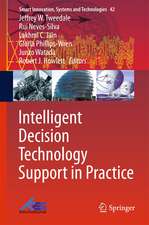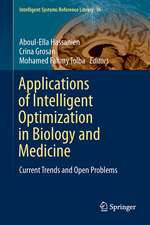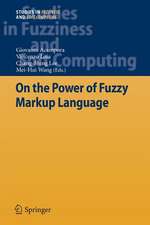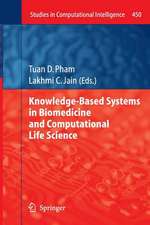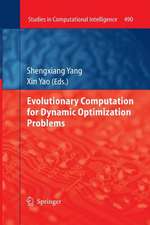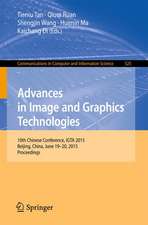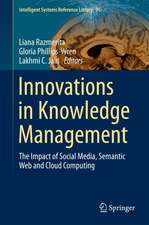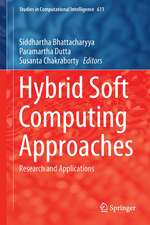Advances in Artificial Intelligence: 12th Brazilian Symposium on Artificial Intelligence, SBIA '95, Campinas, Brazil, October 11 - 13, 1995. Proceedings: Lecture Notes in Computer Science, cartea 991
Editat de Jacques Wainer, Ariadne Carvalhoen Limba Engleză Paperback – 27 sep 1995
The book presents three invited papers and 31 revised full papers selected from a total 57 submissions, more than half of them coming from abroad. The papers are organized in sections on knowledge representation and automated reasoning, tutoring systems, machine learning, neural networks, distributed artificial intelligence, knowledge acquisition and knowledge bases, and natural language processing.
Din seria Lecture Notes in Computer Science
- 20%
 Preț: 1061.55 lei
Preț: 1061.55 lei - 20%
 Preț: 307.71 lei
Preț: 307.71 lei - 20%
 Preț: 438.69 lei
Preț: 438.69 lei - 20%
 Preț: 579.30 lei
Preț: 579.30 lei -
 Preț: 410.88 lei
Preț: 410.88 lei - 17%
 Preț: 427.22 lei
Preț: 427.22 lei - 20%
 Preț: 596.46 lei
Preț: 596.46 lei - 15%
 Preț: 448.04 lei
Preț: 448.04 lei - 20%
 Preț: 353.50 lei
Preț: 353.50 lei -
 Preț: 389.49 lei
Preț: 389.49 lei - 20%
 Preț: 309.90 lei
Preț: 309.90 lei - 20%
 Preț: 645.28 lei
Preț: 645.28 lei - 20%
 Preț: 763.23 lei
Preț: 763.23 lei - 15%
 Preț: 580.46 lei
Preț: 580.46 lei - 20%
 Preț: 310.28 lei
Preț: 310.28 lei - 20%
 Preț: 655.02 lei
Preț: 655.02 lei - 20%
 Preț: 1183.14 lei
Preț: 1183.14 lei - 20%
 Preț: 340.32 lei
Preț: 340.32 lei -
 Preț: 449.57 lei
Preț: 449.57 lei - 20%
 Preț: 591.51 lei
Preț: 591.51 lei - 18%
 Preț: 938.83 lei
Preț: 938.83 lei - 20%
 Preț: 337.00 lei
Preț: 337.00 lei - 20%
 Preț: 649.50 lei
Preț: 649.50 lei - 20%
 Preț: 607.40 lei
Preț: 607.40 lei - 20%
 Preț: 1414.79 lei
Preț: 1414.79 lei - 20%
 Preț: 1024.44 lei
Preț: 1024.44 lei - 20%
 Preț: 583.40 lei
Preț: 583.40 lei - 20%
 Preț: 453.32 lei
Preț: 453.32 lei - 20%
 Preț: 575.49 lei
Preț: 575.49 lei - 20%
 Preț: 1075.26 lei
Preț: 1075.26 lei - 20%
 Preț: 585.88 lei
Preț: 585.88 lei - 20%
 Preț: 825.93 lei
Preț: 825.93 lei - 17%
 Preț: 360.20 lei
Preț: 360.20 lei - 20%
 Preț: 763.23 lei
Preț: 763.23 lei - 20%
 Preț: 340.32 lei
Preț: 340.32 lei - 20%
 Preț: 504.58 lei
Preț: 504.58 lei - 20%
 Preț: 369.13 lei
Preț: 369.13 lei - 20%
 Preț: 580.93 lei
Preț: 580.93 lei - 20%
 Preț: 343.62 lei
Preț: 343.62 lei - 20%
 Preț: 350.21 lei
Preț: 350.21 lei - 20%
 Preț: 583.40 lei
Preț: 583.40 lei - 20%
 Preț: 583.40 lei
Preț: 583.40 lei - 15%
 Preț: 438.59 lei
Preț: 438.59 lei - 20%
 Preț: 341.95 lei
Preț: 341.95 lei - 20%
 Preț: 238.01 lei
Preț: 238.01 lei - 20%
 Preț: 538.30 lei
Preț: 538.30 lei
Preț: 335.69 lei
Preț vechi: 419.61 lei
-20% Nou
Puncte Express: 504
Preț estimativ în valută:
64.25€ • 69.82$ • 54.01£
64.25€ • 69.82$ • 54.01£
Carte tipărită la comandă
Livrare economică 21 aprilie-05 mai
Preluare comenzi: 021 569.72.76
Specificații
ISBN-13: 9783540604365
ISBN-10: 3540604367
Pagini: 360
Ilustrații: XII, 342 p.
Dimensiuni: 155 x 235 x 19 mm
Greutate: 0.51 kg
Ediția:1995
Editura: Springer Berlin, Heidelberg
Colecția Springer
Seriile Lecture Notes in Computer Science, Lecture Notes in Artificial Intelligence
Locul publicării:Berlin, Heidelberg, Germany
ISBN-10: 3540604367
Pagini: 360
Ilustrații: XII, 342 p.
Dimensiuni: 155 x 235 x 19 mm
Greutate: 0.51 kg
Ediția:1995
Editura: Springer Berlin, Heidelberg
Colecția Springer
Seriile Lecture Notes in Computer Science, Lecture Notes in Artificial Intelligence
Locul publicării:Berlin, Heidelberg, Germany
Public țintă
ResearchCuprins
Rethinking and reinventing Artificial Intelligence from the perspective of human-centered computational artifacts.- Automatic documentation generation: Including examples.- Market-oriented programming (abstract).- Belief increasing in SKL model frames.- Sensitivity of combination schemes under conflicting conditions and a new method.- Two conditional logics for defeasible inference: A comparison preliminary version.- Underlying semantics for the assessment of Reiter's solution to the frame problem.- Modeling intentions with extended logic programming.- Labelled theorem proving for substructural logics.- Labelled abduction.- PROMAL: Programming in modal action logic.- A goal directed reasoning for semi-normal default theories.- Towards new learning strategies in intelligent tutoring systems.- Modeling the influence of non-changing quantities.- Mathema: A learning environment based on a multi-agent architecture.- A general model of dialogue interpretation for concept tutoring systems.- Knowledge based clustering of partially characterized objects.- Constructing the extensional representation of an intensional domain theory in inductive logic programming.- A generic algorithm for learning rules with hierarchical exceptions.- A neural model for the visual attention phenomena.- Learning rare categories in backpropagation.- An automatic adaptive neurocomputing algorithm for time series prediction.- A computational approach to situation theory based on logic programming to design cognitive agents.- Measuring agreement and harmony in multi-agent societies: A first approach.- Detecting the opportunities of learning from the interactions in a society of organizations.- Exploiting social reasoning to enhance adaptation in open multi-agent systems.- A system for aiding discovery: Mechanisms for knowledge generation.- On a composite formalism and approach to presenting the knowledge content of a relational database.- Method for knowledge acquisition from multiple experts.- A conceptual model for a knowledge base homogeneously stored in a database environment.- A hierarchical description of the Portuguese verb.- TALISMAN: A multi-agent system for natural language processing.- Part-of-speech tagging for portuguese texts.- Quantification and cognitive constraints in natural language understanding.









